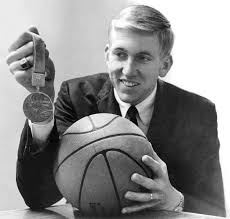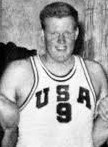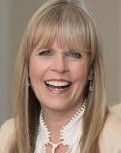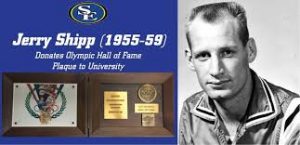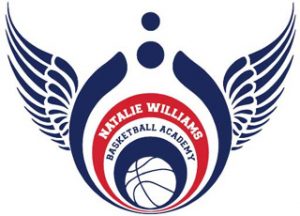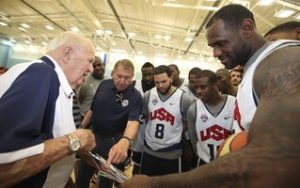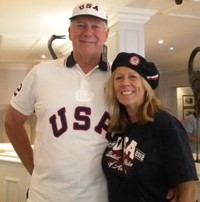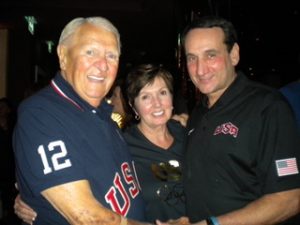The NBA Finals date back to 1947 (when they were known as the Basketball Association of America Finals) and the very 1st NCAA tourney was held in 1939. Olympic basketball competition is even older: it debuted as a demonstration event in 1904 and the men’s version became a medal sport in 1936, with the women finally getting their chance to go for the gold in 1976. The United States has dominated Olympic basketball competition from the start: the men have won 15 gold medals in the 18 tournaments they have participated in during the past 84 years, while the women have won 8 gold medals in the 10 tournaments in which they have competed during the past 44 years. Those of you who were looking forward to the 2020 Olympics opening ceremonies in Tokyo on July 24, 2020 will have to wait an extra 364 days, as the coronavirus caused a postponement until July 23, 2021. Due to the absence of college basketball since mid-March, HoopsHD’s Jon Teitel decided to fill the void by trying to interview as many prior Olympic players/coaches as possible so that you have something to read this summer while not watching the Summer Games. We continue our coverage by chatting with Bill Hosket about winning an NBA title in 1970 and a gold medal in 1968.
In 1964 you were named a Parade All-American: which of your fellow honorees impressed you the most (Lew Alcindor/Don Chaney/Wes Unseld/other)? Looking back on it now I realize that it was a nice honor but I am not sure how much it meant because I do not know how many of the voters actually saw us play.
That spring you won a state title at Belmont High School and were named MVP of the state tourney: what made you choose Ohio State? My father had played there in the 1930s after going to high school in Dayton. He passed away when I was 10 so we never really got to compare notes. When I was growing up a lot of people asked me if I would go to the same school that my father did. Following in his footsteps directed my life a lot of the time.
You led the Buckeyes in PPG/RPG during each of your 3 varsity seasons, were named to the All-Conference Academic 1st-Team 3 times, and became the 1st Academic All-American in school history: how were you able to balance your work on the court with your work in the classroom? My mother was always interested in education but never got a chance to go to college due to the Depression. For a city high school we had a great group of teachers so we tried to do as well as we could in the classroom as well as in extracurricular activities. Jerry Lucas was a prominent name who grew up 20 miles south of me and got a lot of notoriety for both athletics/academics so I tried to emulate him. Ohio State coach Fred Taylor said that we would graduate from college and work toward winning: he had 102 players letter for him and 97 of them got their degrees! It was a different era with no 1-and-done players, and by not playing as freshman it helped us get acclimated to class and allowed us to learn how to play.
Take me through the 1968 NCAA tourney:
In the Elite 8 you passed the ball to Dave Sorenson for the game-winning bank shot in a 1-PT win at Kentucky: how much of a home-court advantage did the Wildcats have in Lexington, and did you think that Sorenson’s shot was going in? It was kind of a broken play. Dan Issel was guarding me and lowered his arm so I just threw it to Dave when he popped open. Kentucky had a great year and was definitely the favorite so we were fortunate to upset them. The state police surrounded the baskets and said, “Boys, those nets belong to the university and are not to be touched!” They did not bring out the ladders but we got a pair of scissors and the police broke it up immediately.
After losing to North Carolina in the Final 4 you had 19 PTS/17 REB in a 4-PT win over Houston in the consolation game: where does Elvin Hayes (34 PTS/16 REB) rank among the greatest players that you have ever seen? Elvin was a great talent and was just physically imposing with a fadeaway jump shot. Chaney was on that team as well so they were very talented, along with my future Olympic teammate Ken Spain. I think they made the Final 4 during each of Elvin’s 3 years there and were 31-0 entering the 1968 Final 4 before losing to UCLA in a rematch of the Game of the Century that had occurred 2 months earlier.
In the spring of 1968 you were drafted 10th overall by the Knicks (9 spots behind Hayes): did you see that as a validation of your college career, or the realization of a lifelong dream of reaching the NBA, or other? It was interesting because there was no Internet back then so communication was different. We played against Marquette and lost to them in the Rainbow Classic: afterward Coach Al McGuire congratulated me on a great game and said he would call his brother (Knicks coach Dick McGuire) to tell him about me. I really did not know what would happen in the draft because 1 magazine said I was a “can’t miss prospect” while another 1 said that I had a bad knee. I found out that I got drafted while I was at the Olympic Trials in Albuquerque when Knicks GM Eddie Donovan called me. I was happy but knew that I would miss training camp as well as a few regular season games due to the Olympics. We were always encouraged to stay in Columbus during the season but 1 year my roommate and I drove to Cincinnati to see the Knicks play the Royals. I wanted to see how good 1965 national POY Bill Bradley was but he never played that night: he later told me that was the only game of his career that he never played! The Knicks were a talented/deep team with a bunch of good guys.
That fall you played for team USA at the Olympics: what did it mean to you to represent your country, and what did it mean to you to win a gold medal? It was a great thrill and an honor to have competed. There was some pressure on us: a lot of seniors were encouraged not to attend the trials because those who were drafted into the pro would have to miss training camp, and other players boycotted due to racial reasons. Elvin/Wes Unseld signed NBA deals and Lew Alcindor skipped it so a lot of people thought that we would be the 1st US basketball team to ever lose but Coach Iba did a great job with all of us. He was a taskmaster but trained us really well: he turned Spencer Haywood from an athlete into a basketball player in just 6 weeks. It was the only Olympic sport at the time that was native to the US and we certainly did not want to be the 1st team to lose so we were fortunate to win. It is something I really cherish.
Take me through the magical 1970 NBA Finals:
In Game 3 Jerry West scored 34 PTS including a 60-foot buzzer-beater at the end of regulation but the Lakers ended up losing by 3 PTS in OT: where does that rank among the most clutch shots that you have ever seen? That rates up there but it would have meant more to him had the Lakers won the game. I was sitting on the bench and saw that his shot had a little backspin on it. I said to my teammates that he was going to make it and it found nothing but the bottom of the net. Dave DeBusschere dropped to his knees and I saw Jerry walking to his bench while just shrugging with his palms up. When something like that happens you feel destined to not win.
In Game 7 an injured Willis Reed walked onto the court during warmups and scored 4 PTS to help clinch the title: did you think that he would be able to play, and what did it mean to you to win a title? Willis had such strength of character as well as physical strength. We roomed together on the road and he said that he would play even though he could not walk while in the locker room before the game. We did not know for sure but when he came out it was incredible: there are few scenes like that in sports. It was like the fans and our team became 1: it was bedlam and even the Lakers stopped warming up to watch what was going on! It shows you how strong-willed he was to risk personal injury for the good of the team. We really played well the year before as well but could not get by Boston.
After retiring as a player you served 3 terms on the US Olympic Basketball Committee: how did you get the job, and how did you select the players? I think that I was just invited because they liked to have a former player fill a slot on the Committee. In 1972/1976 there were budget concerns over how many players could be invited to the Trials and what location would offer the cheapest airfare. We had territories/subcommittees that we covered: I remember that Bob Knight really wanted to coach the team in 1980 because the Olympics were in Russia but they chose Dave Gavitt before President Carter said that the US would not participate. That could have been Magic Johnson/Larry Bird’s last chance to be in the Olympics as amateurs but they later had the opportunity to play with the Dream Team.
Your father Bill Sr. won 3 state titles at Stivers High School from 1928-1930 and was later inducted into the Ohio Basketball Hall of Fame, and your son Brad also played basketball at Ohio State: who is the best athlete in the family? My dad was ambidextrous and played in a different era. He was 6’5” and was almost considered a giant back then. He could throw a football with either hand equally well. After college he formed a pro team and won the state tourney 2 years in a row: they were the original “Hoosiers”. He helped the players get jobs in the Dayton area and then play games on Sunday: they were a big deal in Ohio. He had a pretty illustrious playing career and later became an official. Brad was 6’3” but could really get up in the air so I will let others decide.
You currently are a principal at Hosket Ulen Insurance Solutions: how do you like the job, and how long do you plan to keep doing it for? I was in the paper business for a long time and then decided to switch industries about 14 years ago. Brad is now the managing partner here and 1 of my other sons is in sales so it has been good to see it grow. It has been a fun experience and I am just glad that they have not fired me yet! We are struggling like all companies during the pandemic: it is frustrating to not get out there and meet with customers but I cannot imagine being in the retail/restaurant business. We are all in it together but it has gone beyond temporary and is a trying time for a lot of people. I attend the high school state tourney every year but it got canceled last spring, as did the 50th reunion of our 1970 NBA championship team. I had great coaches/tremendous teammates but if the virus had hit back then it could have been very different due to timing. It makes me appreciate what I had and I feel bad for those who have missed out on opportunities due to something that is beyond their control. If you cannot sell your product then you cannot make any money but somehow we have been able to keep all of our people employed.

